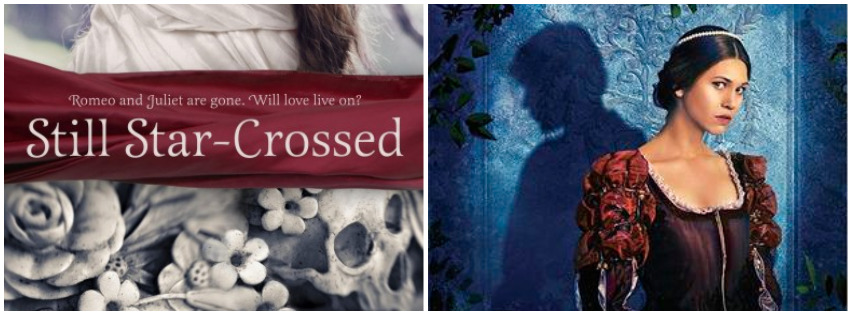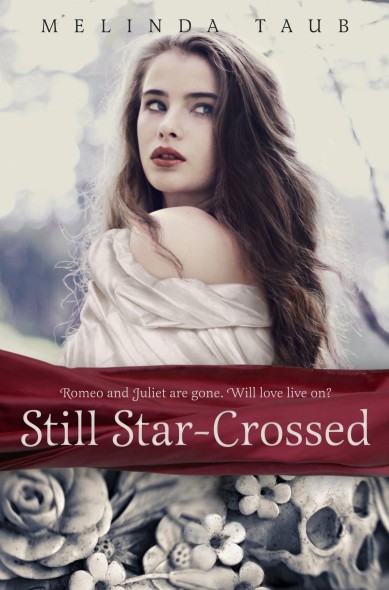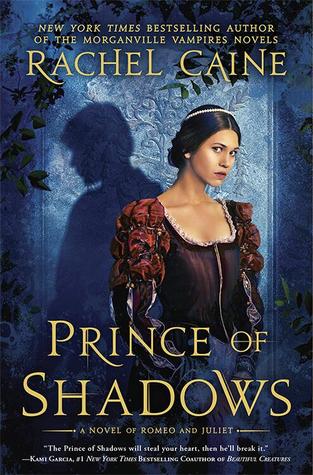Book Reviews – In the Glassy Margents
“Love well, if not wisely”: Romeo and Juliet… and Benvolio and Rosaline

One of the great things appropriation can do is redefine “who lives, who dies, who tells your story” (to borrow from Lin-Manuel Miranda). Two recent novels closely inspired by Romeo and Juliet engage directly with these questions: Who lives? Who dies? Why? What events matter; whose voices do we hear? Whose story gets told?
 Still Star-Crossed by Melinda Taub is a direct sequel to the events of Romeo and Juliet. The Capulets and Montagues are still at each other’s throats, despite their grief and the fragile peace imposed by Escalus. In an attempt to quash the escalating (heh) violence once and for all, Escalus arranges a marriage between the two surviving young Capulets and Montagues: Rosaline and Benvolio. Nobody is happy about it, least of all the two intendeds. But tragedy gives way to mystery and romance as Rosaline and Benvolio team up to uncover a dastardly plot.
Still Star-Crossed by Melinda Taub is a direct sequel to the events of Romeo and Juliet. The Capulets and Montagues are still at each other’s throats, despite their grief and the fragile peace imposed by Escalus. In an attempt to quash the escalating (heh) violence once and for all, Escalus arranges a marriage between the two surviving young Capulets and Montagues: Rosaline and Benvolio. Nobody is happy about it, least of all the two intendeds. But tragedy gives way to mystery and romance as Rosaline and Benvolio team up to uncover a dastardly plot.
It’s a fun novel, but beyond using tragedy as a jumping-off point for mystery-romance, Taub makes a radical move in transforming Rosaline from a non-character into a heroine. In Romeo and Juliet, Rosaline is a name and a name only; she has no lines, no stage directions, and is not listed among the dramatis personae. Taub’s Rosaline is not just a focus for Romeo’s Petrarchan poetry but a protagonist in her own right. This transformation of a woman-as-object—a woman who is not even a character but a poetic construct of the male imagination—is a powerful act of appropriation and reclamation. She focalizes most of the story, and it is her point of view and her voice that dominate the narrative.
 In Prince of Shadows by Rachel Caine, it is Benvolio who takes center stage (so to speak). Caine’s retelling functions as a prequel, an alternate perspective, and a coda to Romeo and Juliet. The events surrounding and encompassing Shakespeare’s play unfold through the eyes of the one character who is usually best at restraining the Capulet-Montague violence. Caine’s Benvolio is uneasily positioned as a cadet-branch Montague, often tasked with keeping the younger Romeo out of trouble. The violence of the feud suffuses every scene: it haunts every decision made, every word exchanged between Benvolio and his friends and enemies. While Romeo’s Petrarchan poetry helps him (however futilely) “doff that name,” Benvolio embodies the contradictions of a particular version of Montague masculinity: he abhors the feud but craves the release of violence; he despises the authoritarian control of the family but reaps the benefits of its status. He copes with the pressure by engaging in cat burglary—initially against those who have insulted the Montagues; but increasingly his burglary takes on a Robin Hood quality as he thieves from those who commit injustice the law will not remedy.
In Prince of Shadows by Rachel Caine, it is Benvolio who takes center stage (so to speak). Caine’s retelling functions as a prequel, an alternate perspective, and a coda to Romeo and Juliet. The events surrounding and encompassing Shakespeare’s play unfold through the eyes of the one character who is usually best at restraining the Capulet-Montague violence. Caine’s Benvolio is uneasily positioned as a cadet-branch Montague, often tasked with keeping the younger Romeo out of trouble. The violence of the feud suffuses every scene: it haunts every decision made, every word exchanged between Benvolio and his friends and enemies. While Romeo’s Petrarchan poetry helps him (however futilely) “doff that name,” Benvolio embodies the contradictions of a particular version of Montague masculinity: he abhors the feud but craves the release of violence; he despises the authoritarian control of the family but reaps the benefits of its status. He copes with the pressure by engaging in cat burglary—initially against those who have insulted the Montagues; but increasingly his burglary takes on a Robin Hood quality as he thieves from those who commit injustice the law will not remedy.
Benvolio meets Rosaline by chance during a revenge burglary against Tybalt, and the pair form a gradual alliance against their more extreme relatives. The alliance develops into mutual respect and love as the events of Romeo and Juliet unfold and Verona descends into chaos. Their romance faces the same practical obstacles as Romeo and Juliet’s, but Caine introduces a supernatural element to account for the relentless tragedy: Mercutio’s “plague on both your houses” is a literal curse that relentlessly drives Romeo and Juliet to their deaths. Benvolio and Rosaline escape it only through self-awareness and determination not to suffer the fate of their cousins.
Both novels pay homage to Shakespeare through their use of language. The voice of Still Star-Crossed is a complex, sometimes uneasy hybrid of early modern speech and modern English narration. The disjoint emphasizes the appropriation across forms: the novel takes on a dramatic, performative quality with every shift from internal thought and narration to spoken dialogue. Taub weaves in many lines from Romeo and Juliet, often as a kind of in-joke for the careful reader. Even more interestingly, Still Star-Crossed plays with the idea that the Romeo and Juliet might share a world with Shakespeare’s other works: characters from Much Ado about Nothing inhabit the background political situation, and a cheerful grave-digger sings the graveyard song from Hamlet (taught to him by a cousin who lived among the Danes). In Prince of Shadows, by contrast, Caine adjusts the language of her borrowings so that they seem an organic part of her prose. The seams are nearly invisible; the hybridity of forms is masked. Lines verbatim and reworked from Romeo and Juliet, Hamlet, and Othello give Shakespearean texture and weight to the narration; though the potential for crossover is more implicit than in Still Star-Crossed, the web of references nevertheless opens up possibilities for more extensive intertextuality.
Appropriation is always an invitation to revisit the source material, and these novels draw attention to particular threads in Romeo and Juliet: the personal grief engendered by the feud and the machine of systemic violence; the silence and speech of Juliet and the other female characters; the stakes of claiming an individual identity in defiance of destructive, violent expectations. In light of these themes, Benvolio and Rosaline are particularly congenial vehicles for appropriation because they are so peripheral in Shakespeare’s text. Rosaline, as noted earlier, is not a character but a name, a poetic construct who is deaf to Romeo’s verse. Benvolio disappears after Mercutio’s death; in the first quarto edition, he actually dies. He has no grand speeches; apart from his attempts to keep the peace, we know little about him. Both are ripe for creative reconstruction and reinterpretation. In these appropriations, Benvolio and Rosaline survive first the events of Romeo and Juliet and then their own stories—under the same pressures and constraints as Romeo and Juliet—because they are a little older, a little more self-aware, a little less desperate. Their stories, with happy endings, are versions of what might have been. Romeo and Juliet are thwarted at every turn not only by the feud but by a relentless plot in which everything that can possibly go wrong does so. Taub and Caine’s novels are a way of addressing frustration with the idea that the greatest love story ever told ends in pointless deaths. These versions of Benvolio and Rosaline not only love and live: they arise from the margins, from shadows, from silence, to tell their own stories.
Works Cited
Caine, Rachel. Prince of Shadows. New York: New American Library, 2014.
Miranda, Lin-Manuel (comp). Hamilton. Atlantic, 2015.
Taub, Melinda. Still Star-Crossed. New York: Dial, 2013.
